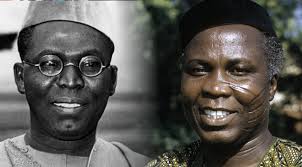By Emmanuel OLADIPO OJO, Ph.D.
History often casts Chief Samuel Ladoke Akintola in the long shadow of betrayal. To many Nigerians, especially in the southwest, he is remembered less for his political legacy and more for a single label — “Afonja” — a symbol of treachery. But is this a fair portrayal?
In a bold and well-researched reinterpretation, Dr. Emmanuel Oladipo Ojo challenges this long-standing narrative in his paper, “The Awolowo–Akintola Leadership Tussle: A Reinterpretation” (Journal of Arts and Humanities, Vol. 05, No. 01: 76–90). Dr. Ojo argues that calling Akintola “Afonja” — a direct allusion to the 19th-century Yoruba general accused of inviting destruction upon the Oyo Empire — is both historically lazy and politically misleading.
Chief Obafemi Awolowo, an Ijebu-Yoruba, served as the first Premier of the Western Region from 1954 to 1959 and was the federal leader of the Action Group, which he founded in 1951. His deputy, Chief Ladoke Akintola, a Yoruba man from Ogbomoso, succeeded him as Premier in 1959 and held the position until the 1966 coup that claimed his life.

Their fallout was one of the most defining political rifts in post-independence Nigeria. While Awolowo was viewed as visionary and principled by his followers, detractors saw him as headstrong, rigid, and at times, vindictive. On the other hand, Akintola was painted by his critics as a betrayer — “Judas,” “Afonja,” a man who colluded with the Northern People’s Congress (NPC), the dominant Hausa-Fulani party, in defiance of Yoruba interests.
But Akintola’s position, according to Dr. Ojo, deserves deeper reflection. After the Action Group lost the 1959 federal elections, Awolowo rejected collaboration with the NPC, insisting that the Yoruba could not ally with a Hausa-Fulani dominated party. Akintola disagreed. He argued that political reality, not sentiment, should drive strategy. Since the North represented the largest voting bloc in the country, Akintola believed a partnership was necessary to secure Yoruba relevance in federal power-sharing.
He feared that continued Yoruba isolation from the federal government would leave the “national cake” — jobs, contracts, and influence — to the Igbo and Hausa-Fulani. For Akintola, pragmatism required forming alliances, even with ideological opponents. His call for cooperation was not born out of betrayal, Dr. Ojo contends, but from political foresight.

Eyewitnesses and associates from both Ikenne (Awolowo’s hometown) and Ogbomoso described Akintola as deeply loyal to Awolowo — a man who once served almost like an “errand boy” to his political mentor. One community elder insisted there was “no single person in the Action Group who respected and submitted to Chief Awolowo more than Chief Akintola.”
So, what caused the breakdown? Some say it was Awolowo’s rigidity; others blame Akintola’s ambition. One respected elder near Awolowo’s compound used a Yoruba proverb to explain: “Ba bá lé ewúré kán ogiri, ó máa bùn í jé” — “When you chase a goat to a wall, it turns and fights back.”

In the end, Akintola’s defiance was as total as his earlier obedience — but to reduce him to the caricature of a traitor is to erase the complexity of Nigeria’s early political history. Dr. Ojo invites us to reassess that story.
Credit: Culled from: “The Awolowo–Akintola Leadership Tussle: A Reinterpretation,” Journal of Arts and Humanities, Vol. 05, No. 01: 76–90 by Emmanuel Oladipo Ojo, Ph.D.


